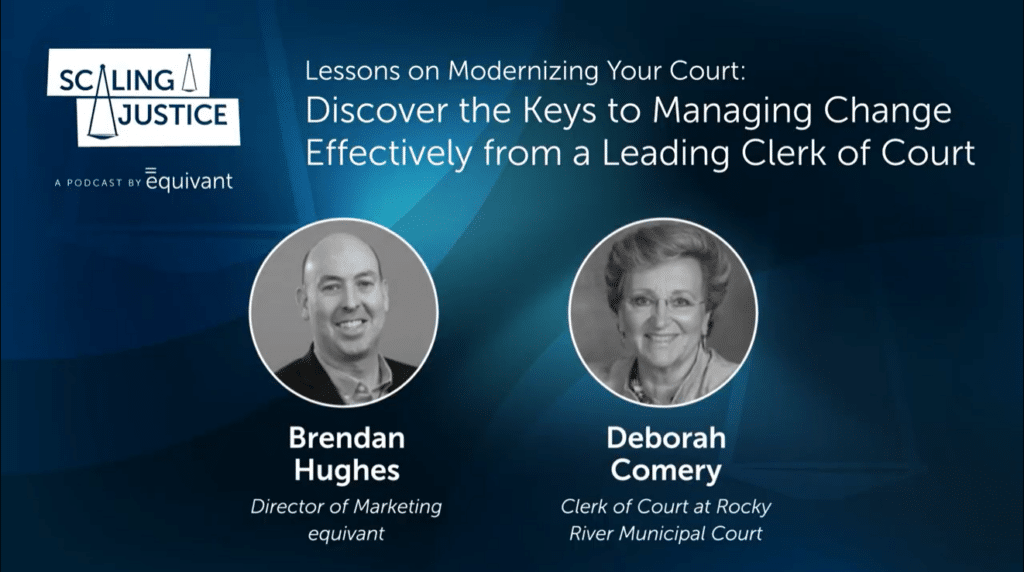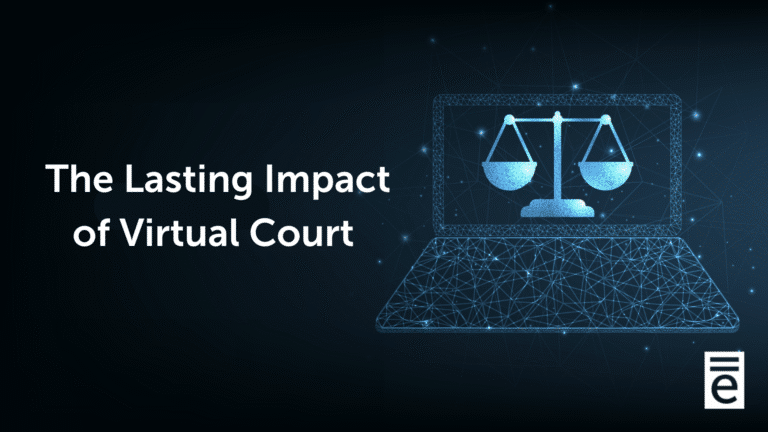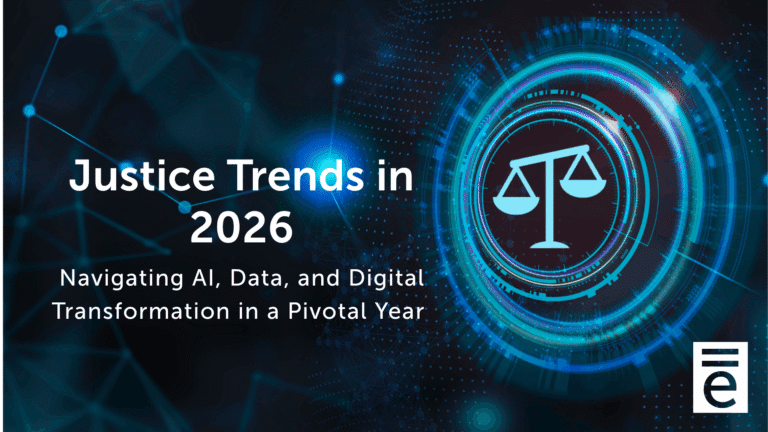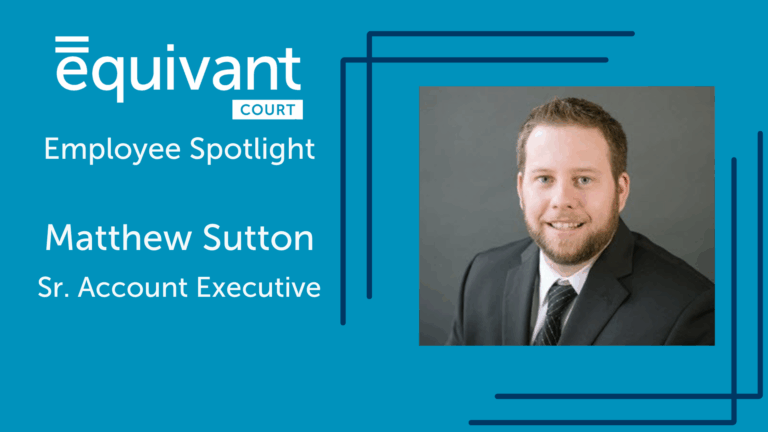Scaling Justice • An equivant podcast
As technology continues to evolve more and more quickly, it can feel difficult to keep up. Managing change while you’re trying to modernize your court takes work. Fortunately, there are so many court leaders doing amazing things that have great advice to share to help make the process easier.
In our most recent podcast episode, Deborah Comery, Clerk of Court at Rocky River Municipal Court in Ohio (a former Clerk of the Year in Ohio), shares her insights in Lessons on Modernizing Your Court: Discover the Keys to Managing Change Effectively from a Leading Clerk of Court.
In this episode, you’ll learn:
· The most essential part of managing a technology change…and it has nothing to do with technology
· Important questions to ask any vendor before starting a project
· How to navigate different types of personalities and job types at a court—from administrative staff and IT employees to Judges
Watch on YouTube:
Stream Audio Version:
Scaling Justice Podcast Transcript
Lessons on Modernizing Your Court: Discover the Keys to Managing Change Effectively from a Leading Clerk of Court
Brendan Hughes: Hello and welcome to Scaling Justice, a video podcast by equivant that operates at the forefront of the justice space. I’m Brendan Hughes, marketing director at equivant. Here at equivant, we’re all dedicated to delivering innovative solutions to simplify justice. We are joined today by a special guest, Debbie Comery, Clerk of the Rocky River Municipal Court in Ohio, and she has been the Clerk since 2008. She was elected in 2007 and has been instrumental in having her court recognized as one of the most efficient and technologically advanced courts in the state.
[She] achieved numerous distinctions during her leadership and has even been honored as the Clerk of the Year of the state of Ohio. So today we’re going to talk about how justice and court leaders can build and run a court operation smoothly and efficiently and set it up for long-term success. Debbie has seen many operational and economical challenges during her tenure, experienced many advancements in technology and navigated a myriad of challenges including running a successful court during a pandemic. So through it all, Debbie has developed lessons and best practices, and we’re here today to listen as you share some of the ways you’ve succeeded and how others, most importantly, can learn from it. So welcome, Debbie.
Debbie Comery: Well, thank you very much, Brendan. It’s a pleasure to be here. Anytime I can share is always a good time.
Brendan Hughes: I think a good place to start is that for any Clerk of Court, or depending on the state or district what their name is (the person that’s in charge of running the business of the court), what are some key factors, in your experience, that keeps a court running smoothly and efficiently?
Debbie Comery: Well, interestingly enough, this major facet of that question is going to be something that you’re going to hear me say more than this time.
Brendan Hughes: Okay.
Debbie Comery: In my opinion, humble as I may be, the whole crux of a good operating court is the staff that you hire. Everything that we do as a court really pivots on that staff issue. They have to, without question, work well with others. And that’s a difficult one to discern when you’re doing interviewing. But if you’re lucky, you have a sense of it.
The second bit is they have to work well under pressure. The court has two separate divisions. One is the civil, and the other is the criminal traffic. And it’s the criminal traffic side that has to have staff that understand the sense of urgency and live it, and work it, and do it. And then also they have to work with a conscious effort toward accuracy because the case record involves people, and those people are just like you and me and the things that a court does affects them. Something like the issuance of a warrant, for example. We do that with the full knowledge that that individual is going to lose his right to his liberty for a period of time, and you don’t want one of those out there for somebody who doesn’t deserve to have it.
And so it’s that under pressure, [and] working with accuracy. I cherish anybody who can be absolutely perfect, and nobody is. I mean, that’s human nature. And what I do at the end of a month is I find those errors and correct them so that there are no errors within the court record.
Brendan Hughes: Interesting.
Debbie Comery: It really is. So the staff, in my opinion, is the one and only piece to running smoothly. It doesn’t matter if you are in the clerk’s office, if you are in the probation department, or if you work for the judges. And understand too that ultimately, at the end of the day, the main decision maker for all things court is the administrative judge. He or she overrules anything ultimately. And so it’s the judge, the administrative presiding judge, who really a clerk either works for or, as in about 45 courts– municipal courts– in the state of Ohio, there are about 45 of us who are elected.
Brendan Hughes: Interesting.
Debbie Comery: And so we’re all equal, judges and clerks. But at the end of the day, it’s that administrative presiding judge who has the final say. But it’s just imperative that whether you work for him or whether you work with him or her, that you do that so that the court runs well. And that cooperation is again, one of those important factors to the question of how do you get it to work smoothly and efficiently.
Brendan Hughes: Yeah, that’s so interesting. I’m guessing because over your time as a leader of the clerk, or as the leader of the court, that different trends have come and gone, different technologies have come and gone, ways to organize things, best practices change. But to you, the biggest thing is “it’s the people”.
Debbie Comery: It is. I can’t stress that strongly enough. There are courts, and sorry if I offend anybody, but there are courts with elected officials. Elected officials can have a[n] obligation or a need to hire people who have helped them attain their office, and they are not always the best person for the job. And I’ve seen too many courts where the staff, for example, of a clerk’s office with an elected clerk is really, if one was to be honest, is an office that really has some serious difficulties with their staff. And that shouldn’t be, it can’t be, if you’re going to run a good court.
Brendan Hughes: Yeah.
Debbie Comery: You have to hire people that are innately prone to working well together, otherwise all the effort in the world, all the little meetings, all the little advancements to all these cute little programs that make an office click, are pointless.
Brendan Hughes: Unless you have the right people.
Debbie Comery: Exactly.
Brendan Hughes: Well, that kind of leads into the next thing that I wanted to ask you about, which was when you have the right people there, and as a court you’ve probably had this experience where you’ve identified something that could be better or “this process isn’t working, it could be better”, what do you do? How do you go about improving something like that?
Debbie Comery: Well, actually, so much of what we do is completely reliant on the staff that we have, and I’ve certainly talked that to death. But those people who are dedicated to their individual job criteria and achieve that error free (as possible) that they go through, they are the best preventative to needing improvement. But when there is a need, usually those little tweaks can make such a huge difference in a daily outcome and can come from team effort, including those people involved with the key issue. It’s imperative to have people in a team situation and you can come to a meaningful solution on whatever it is that’s creating a problem.
And we’ve done that. In fact, just this morning, the judge wanted a certain… we have arraignments. Arraignments are the initial court that people come to make their plea of not guilty, guilty, or no contest. And we have a Christmas and New Year’s holiday that’s right smack in the middle of a week. And so, one of the days that we have off which is Christmas day, of course you’re not going to work then, is on one of our arraignment days. And so it’s created a bit of a conundrum.
And so the Clerk’s Office decided that it would be nice to do everything on the Monday of that week, both Christmas and New Years. So it’s a matter of, okay, so the Clerk’s Office came up with this idea and so now I’ve got to present it to the judges. Do you have a problem with that? The magistrates that are going to work it are A and B, and do you see a problem with having it all on one day and that day being Monday? So anyway, so it’s that kind of communication.
I write the email to the judges and keep my fingers crossed that they’ll agree. And so we just kind of hope for that. I haven’t got an answer yet before I left the office, but that’s the kind of thing that happens. And if you can support the reason why you want it to occur, then usually there’s cooperation.
Brendan Hughes: Yeah, no, that’s interesting too. That through–line with the people that you mentioned, that letting the staff that is responsible kind of take the lead, and then the collaboration to work together to find a solution and make an improvement.
Debbie Comery: Right. And so one of the key facets of that particular issue was normally we have two arraignments a week, and what we are proposing is starting at nine o’clock in the morning, which is the time for one of those two days, and just go with everybody being assigned that nine o’clock hour.
Not two, but just one arraignment now for the week. And I said, well, we can either do it a morning and an afternoon, which is what it would be, or just kick ass (sorry), and go through the morning and do that. And they bought into that. “Yeah, that’s great. And then we can have the afternoon to catch up with whatever we need to catch up with”. But it was that conversation with the girls who do the work for the arraignments from the Clerk’s Office standpoint, and it should run smoothly.
Brendan Hughes: Yeah.
Debbie Comery: So anyway, we’ll see what the judges say.
Brendan Hughes: Yeah, that that was a great example. It makes a lot of sense.
Debbie Comery: It does.
Brendan Hughes: So now I know technology plays a key role in a court’s operation and, in your experience, you’ve probably seen different innovations and advancements. And you mentioned in your experience too, you’ve been kind of at the forefront back when technology was just becoming popular and the Ohio Supreme Court knew something needed to be done with municipal courts. And so you were part of those committees. So what is the key for a court, for the staff, for yourself, for a leader, to evaluate, to implement, and then to adopt a new technology? I imagine there are all kinds of challenges all along the way.
Debbie Comery: Well, there are, and a lot of them are driven by the state legislature, bless their little hearts, but they’re the ones who really are at the forefront of “what records do we keep and how long do we keep them?” And when I started at the court, we had a text-based system that was a little chuggy. It had started in 1988…when we went to computers before my time. And that was the best that was available at that time.
When the clerk at the time that I started, Bill Gareau, when he and I began, we did a survey and had vendors come to us and show their wares. And the best that we saw was what was not equivant, but it became equivant, was their CourtView2 system. So we went from a menu driven text-based where whatever you put, in whatever field you were putting it in, was acceptable. So you could put a name, whole name, a half a name, or whatever, and that’s a one bucket of data.
We went from one bucket of data to a bazillion buckets *plural*, of data because that’s the way they had it. If you had a first name, it went in a bucket, and you had a middle name, it went in another bucket. And a last name went into another bucket. So converting from a menu driven system, which is one bucket, to a multi–bucket system was crazy.
Brendan Hughes: Yeah, I bet.
Debbie Comery: And so the technology involved in that was dramatic, [but] attainable. And so from that point on, we’ve been with equivant. But one of the things that we have, we have record retention. And a clerk, for a definition, is one who retains the court record and the one who is responsible for all the money that goes through the court. Those are, by definition, the two bits.
And so being responsible for every document that comes through the court, be it in or out of the court, clerks are responsible for those. And so when scanning came around, I was giddy – absolutely giddy. Because my thought was, and it has become truth, that if we were to scan, as the court case begins with the original filing and all the documents that are associated with that, if we scan everything from the beginning and everybody from clerks, the deputy clerks, to the bailiffs, to anybody who was going to be participating in a document, if everybody had a scanner, we could scan absolutely up to date with how the case was going and what the case was doing.
And I realized then very early on, because scanning came into CourtView in the early 2000’s, I realized that that was great. And so we climbed on board and got that technology included, and we started out with just scanning a few, but then I realized that doesn’t do diddly. We really do need to do it as the case lives. And so we have been retaining our record electronically since, technically, since about 2010, actually maybe a little bit before that. And we did by local rule, which is one way to make a change in things that are ordered to be done. We made a local rule that stated that we were keeping our records now electronically. And there was an inclusion finally in the Supreme Court rules of superintendents, which is one of the things that we courts live by.
I mean the Supreme Court is the mothership of all motherships. And so they tell us how to do it and when to do it and how much we can do it. So with that said, we did by rule. And then not too long after that the Supreme Court supported what we were doing by making a rule and the rules of superintendents that anything that was scanned could be kept as the court record.
Brendan Hughes: I’m thinking to myself that a couple of these things that you mentioned are really large shifts.
Debbie Comery: Totally.
Brendan Hughes: Yeah. Huge shifts that you’ve seen over time, and there’s probably others that you could mention. How do you get, I’m imagining there’s some resistance to some of these things with staff or a judge. When you talk about going from something that’s a menu with a little bucket to bazillion buckets or you’re talking about something that’s scanning, it’s a whole new thing. How do you deal with the matter of people resistant to change?
Debbie Comery: Well, let’s go back to 1999 when we changed totally the operation of the case management system. Totally different, one system to the other. And I love change, and I love the ability to provide somebody with something better than what they had before. And again, I will go back to staffing and finding people who work well together again, because once you have a bad egg, the eggs multiply. And so, the toughest time for change was that. We had one person who was a judicial staff member who really was difficult to bring [to] the change train.
Interestingly enough, by the time we did make that switch over to CourtView2, she was on board and she was one of our best users as far as accuracy was concerned. And she was just absolutely adorable. And she was somebody who really felt an allegiance to the court and really had devoted much of her career in doing that. And so when I brought that up to her and I showed her the benefits of an improved technology, that was really when she really changed her ideas and came around to it. But again, the staff that we had in the Clerk’s Office, which is most of the users, they realized the benefit that I was trying to bring and the ease of what we do because with each improvement, it becomes easier.
And then right now we’re in the process of converting our CV2 [CourtView 2], which we’ve been with since 1999. We are now going to be starting a new system called JWorks again with the same company that we have. So I know a lot of these people, which is really nice because I’ve worked with them for the last 25+ years in creating the first transition, and now creating a second. I can’t tell you how wonderful it’s been.
We have meetings every week and the personnel, some of them I know and have known, and some of them are new, which is good. But anyway, it’s an interesting “not a conundrum” this time because everybody knows that change is coming and everybody knows that this is something I want and I want it for the right reasons. Because now we’re going to be, they’re learning already from the training that we’ve had, that a lot of the work that they do has been streamlined and it’s going to be so much easier to do what they do. And so that’s the buy-in that you need to get to. Have the willing staff and they need to be convinced early on that it’s going to make their life easier. And once you do that, you have them.
Brendan Hughes: Yeah, no, that’s great. Great advice once you have the right staff, but then also it seems like preparing them and showing them the benefits gets the buy-in for the change.
Debbie Comery: Right. Everybody’s scared. You know, that does bring on a nervous sensation. They’re comfortable with what they do every day because they’ve been doing it forever. And something new is a group thing because anybody that comes in who’s a new employee, well that’s the same thing. They’re changing what they’ve been doing before. But what happens is that you’ve got the entire building going, oh my goodness, what am I going to do? How am I going to do it? But a slow and steady informational type of thing. And now that we’re doing hardcore training, because we go live on December 9th, so it’s coming.
Brendan Hughes: Is there a project that, over the years, stood out to you as one that really went well and also made a big impact that you’d want to tell me a little bit about?
Debbie Comery: Yeah, there have been a number of them, but again, the scanning thing has been key to everything we do. I love the fact that we can electronically file.
We’ve been doing e-filing for a number of years now, and what we did with that is we made it mandatory for attorneys. The judges were on board with that. And fortunately, the administrative judge for many of these was one who really enjoyed the idea of being more electronically, digitally worthy. And so we again, signed up for a new product coming out of the CourtView people that was e-filing.
And so we did make it mandatory through the judge’s local rule that at a certain date, we are going to require them to electronically file. What that does, as anybody knows anything about the websites and all of that requirement, they not only submit an electronic document, which makes it easier for them really, and then they follow that by having a payment included. And so from the civil side, you have to pay to file. And so from that standpoint, it made that bit a lot easier. We also have provided a little entrance to e-filing things, motions and that sort of thing, through the e-filing for the criminal traffic attorneys as well. So we’ve tried to include everybody, but it’s really focused right now on the civil side as far as everything is concerned.
Brendan Hughes: Yeah, it seems like it’s made a big difference.
Debbie Comery: It has. It really has. When you can take a lot of the onus of putting things into the case management system, when you have an e-filing system, it does it automatically. It puts that document in there, it puts all of the original filing information there, and then it does the cost and the payment automatically as well. So it does a lot of things that the clerks, the deputy clerks, don’t need to do. Again, so many things that are new or maybe not what a court is doing, really provides an asset to staff.
Brendan Hughes: You’ve mentioned a few of these things in these projects and kind of alluded to vendors, and I know that’s a big responsibility of a clerk or anybody who’s in charge of their core operations. And what is some advice or some experience you have about working with vendors, selecting them, managing them?
Debbie Comery: Well, in the same way that when you are in the hiring mode and you have to figure out how are these people going to fit into your office. Are they going to be team players and all the rest of that? You have do that same filtering with vendors. There are vendors who will promise you the world and, really, who could sell an igloo to an Eskimo and make them feel like it’s a brand new, great and glorious item when we know it’s not.
So you have to filter the authenticity of what the salesman is trying to sell you. And they make promises willy-nilly. And depending on the company, they really can’t do what they’re promising. They might be able to do it years ahead, but that’s not what you’re buying. You’re buying whatever they’re telling you that they can do. And so filtering, the art of filtering a vendor, is finding out who has what vendor, and then calling that court and saying: “Okay, this vendor is telling me they’re going to do this, this, and so. Are they?” And so, it is an easy process. I have personally, we have… Let me go back.
Through the association that I belong to which most of the municipal courts are members, we have a wonderful, which I started years ago that was one of my pet projects I was doing, what we call Clerk Chat. And it’s an electronic format and we can send an email to our Clerk Chat address through the association, and it goes out to everybody who are members.
And so about a year ago or so, there were people that wanted to know they were getting a new system and they wanted to know, “Alright, who has what?” And so, I did “tell me who you belong to”. And so that information is available to everybody. So I send out every periodically, and I need to do that again real soon, but I send out a list of what I have as to “who has what and who’s getting what”. And so if you’re a person who’s filtering a vendor, you have the ability to find out the truth. Now the other part of that puzzle is that, as I said, about 45 are elected clerks and we have more say in what’s being purchased usually.
But remember what I said, the ultimate decision can be dictated by that administrative presiding judge. And I’m sorry to say, but judges usually don’t have the expertise to appreciate it. Clerks do. Clerks run the whole system, [which] is about the retention of records. And that is a clerk thing. And so when clerks do the research, they usually have a better sense of “who’s what” and who’s really going to deliver whatever they say.
And judges can be swayed. And those judges who have appointed clerks, then that clerk works for the judge. And there can be very little say with all the work that the clerk may have done. I don’t think the judges do the same. And I think they take the word of the salesman, which may or may not be accurate. So that’s the conundrum.
Brendan Hughes: Yeah, it’s interesting the way you’ve kind of equated it with the hiring and staff and it comes back to people.
Debbie Comery: It does. Always.
Brendan Hughes: And vendors or people. And evaluating them on their merits and doing background checks and all of that stuff. Then when you have to work with a presiding judge, it’s relationships there and convincing them and all that stuff.
Debbie Comery: Exactly.
Brendan Hughes: It all comes back to people.
Debbie Comery: It does. Everything does. And that’s why staff is so important. And just so that you totally understand where I’m coming from: When I worked on the project initially in 1999, there were precious few, there were basically three, that were worth looking at. CourtView, Henschen, and a company out of CMS (or something like that) out of the Columbus area. And those were the big three. So it wasn’t tough to pick CourtView. Because it walked, it talked, and it said, “hi, how are you?”
And they were honest at the time saying, “we don’t have e-filing yet, but we are working on it and we will have it as soon as we can and you can have it when you can”. So those additional facets of the case management system: scanning, for example, “we haven’t got it yet, but we’ll have it soon”. And so, they were honest.
Brendan Hughes: The transparency.
Debbie Comery: Right. Most of the people there were absolutely spot on with their honesty. And we had a lot of those things included in our contract with them for the initial system that we purchased saying that when it’s available, we’ll get it. No charge because it’s right there in this contract and we’ve already paid for it.
So doing that kind of thing, making sure that something that you want that may not be available is included in the contract and that there is no additional charge for it whenever it’s available. So I mean, if you want to do it that way, fine. I like to have the stuff working and available.
And JWorks, which is the name of the piece that we’re going to, It too walks and talks. But it walks and talks in 2024. And it’s a totally different looking piece because it’s browser-based. And so that is, you can link things that connect underneath, which you can’t do in most of the other systems. And being browser-based and having that linkage makes things work faster within the system itself. And so that’s the beauty of JWorks.
Brendan Hughes: So if people are, when you talk to somebody that’s a court leader, that’s thinking about technology, especially how things move so fast in today’s environment, and sometimes there’s challenges in courts and what they can adopt and not adopt. But what’s some advice that you would have to somebody about adopting new technology?
Debbie Comery: Well, when you adopt new technology, it is having a sense of knowledge of what you have versus what you could have. And as I said, the judges are often the naysayer to the use of new technology. Their education is critical. As I mentioned before we started this particular conversation, I had the opportunity to go to a judge’s association conference in conjunction with a judge over in Garfield, which is the east side of Cleveland. And that municipal court judge is crazy nuts about new technology. And she was expounding on what she does, and they wanted me, as a clerk, to give an opinion about what it is for a clerk and to have the technology that’s available.
When I had that opportunity to stand before a room full of judges, knowing judges as I do, knowing attorneys as I do, knowing their love for a certain medium media. Because I’m married to one too, and dear God if he doesn’t have the original paper, he’d be lost. But I said to the judges, how many of you are totally in love with paper? And there was silence for a moment, and then there was the chuckle.
And because they are. They have just been taught to live and die by the original paper document. And understand that courts, and at some point you run out of room, these courts have run out of room and they ask their city for more room, more building space somewhere, and usually they’re relegated to the bowels of the building. And usually those conditions are somewhat mildew collecting.
Brendan Hughes: That’s right.
Debbie Comery: And when that’s the case, those records are not really kept in a proper way. Which brings me back to the ability of scanning so that when you scan everything, you have the electronic record and convincing a judge that this is a good thing, that you don’t have to depend on paper, that you can have your case file.
And this is where I have not caved to the judge, but I’ve tried to be considerate until such time as we have judges who love technology as much as I do. But you can say, “listen, we’ll give you the paper during the life of the case, but when the case is over, that paper is going to go away and you’re going to have to live with the scanned document”. And they’re okay with that. They still have the ability to touch and feel the paper and like: Ooh!
Brendan Hughes: That’s right.
Debbie Comery: But we’ve incorporated technology in that though, especially in the criminal traffic department because we do have some police departments that send their stuff to us electronically. So we produce a one page document that has all the information on it, has a copy of the actual citation, but it’s only a copy. But it’s paper, so it’s a good thing. So there you go. You try to make them happy as you can. And then that’s the give and take of it though. We’ll give you paper, but after it’s all over, it’s going to scan and electronic.
Brendan Hughes: I’m wondering, Debbie, because I know you mentioned to me earlier you’re going to be retiring soon or maybe in a year, relatively soon. So what would you want your legacy to be from your time as a clerk of court?
Debbie Comery: Wow, that is a very loaded question, but I think that can best be answered in this way: Every day, I have been there, and I am a working elected clerk. I have tried to do the very best that I am able to do and the best way that I’m able to do it. And I’ve tried to improve everything being done within the Clerk’s Office to streamline it. So time to try to improve everything being done within the Clerk’s Office and streamline it so that time is not wasted where it should be. In the end, I would like to be known as someone who loved what she’s doing, and I do, and in that context, her work for the Rocky River Municipal Court improved the functionality of the court in the most positive way possible.
Brendan Hughes: Yeah, I think that would be a great legacy. And I’m sure that is your legacy if I would ask others. And the people that I know who have talked about you and what you’ve done for your court would heartily agree with that.
Debbie Comery: You’re very kind.
Brendan Hughes: And I appreciate you talking to us today because very interesting to hear your perspective and always being kind of on the leading edge of technology, but then recognizing the challenges that have always come with that each step of the way. And then also very interesting about how important people are to the process and how that makes it all kind of come together. And success is really determined by the people.
Debbie Comery: Right. But being elected clerk, very often there’s this sense of superiority and there are judges that wear the robe and just think that maybe they’re better than the average guy.
And that’s just dependent upon the people. And oftentimes because we are elected, the judges and some of the clerks, it can be a tough road and not everybody agrees. But you’ve got to find the best way to do something for the court that’s going to benefit the court as a whole. And there’s got to be reliance upon the opinion of the clerk because at the end of the day, all that goes on is either in, or out of, or to the clerk’s office.
And how that works, and how well that works, is really dependent upon the cooperation of every single soul in that building. Judge, clerk, deputy clerk, deputy bailiff, bailiff, probation officer: all of us have to find a way to work as best we can together because that’s the way that the court is best operated. And to think otherwise is a fool’s errand.
Brendan Hughes: Yep.
Debbie Comery: It really is. Truly. I can’t stress that strongly enough.
Brendan Hughes: Yep. Well, again, I appreciate you taking the time to talk to us today, Debbie. It was a pleasure.
Debbie Comery: Thank you. Thank you for having me.
Brendan Hughes: Yeah, and I appreciate everyone listening in on this edition of Scaling Justice brought to you by equivant. Contact us at info@equivant.com to weigh in on this episode or let us know what topics you’d like to hear more about. Until next time, I’m Brendan Hughes and this has been Scaling Justice.





